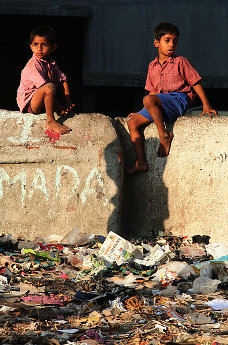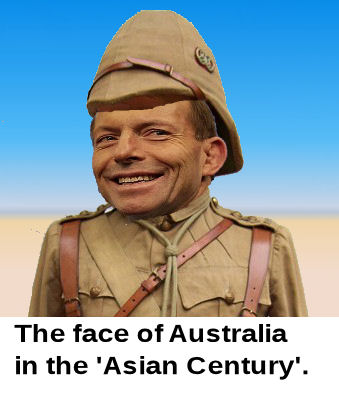
Opposition Treasurer Joe Hockey, on Lateline, warned the public that the Coalition would be looking closely at ''the whole range of entitlements'' - that is, welfare benefits. Hockey said, ''We need to compare ourselves with our Asian neighbours where entitlements programs of the state are far less than they are in Australia.''
Is the "Asian Century" is about downgrading our lifestyles to those of the third-world standards of their teaming and overpopulated cities?
 Image: two boys on a concrete wall, overlooking rubbish in Dharavi.
Image: two boys on a concrete wall, overlooking rubbish in Dharavi.
Original description: Inside Dharavi, Asia's largest slum of over one million dwellers. From producing clay pots to recycling plastic, this slum is also home to hundreds of businesses and defying the many myths of poverty.The sum of these small enterprises have an annual turnover of $665 million!
Opposition Treasurer Joe Hockey, on Lateline, warned the public that the Coalition would be looking closely at ''the whole range of entitlements'' - that is, welfare benefits.
Despite Tony Abbot's efforts to manage what messages the opposition sent to the media, Hockey delivered a provocative speech in London and then mismanaged the interview afterwards.
Hockey's thesis was that Western democracies have been spending more than they could afford on ''entitlements''. ''Government spending on a range of social programs including education, health, housing, subsidised transport, social safety nets and retirement benefits has reached extraordinary levels as a percentage of GDP,'' he stated.
Praising Hong Kong in particular, but also the wider region, he said: ''The Age - The concept of filial piety, from the Confucian classic Xiao Jing, is thriving today right across Asia”. (extended families would be responsible for welfare).
According to the Classic of Filial Piety , Confucius once said: "In serving his parents, a filial son reveres them in daily life; he makes them happy while he nourishes them; he takes anxious care of them in sickness; he shows great sorrow over their death; and he sacrifices to them with solomnity". It is this single principle that holds the families together, thereby binding the society to hold itself, and ultimately protecting the whole race and the nation. At the moment it allows SE Asian economies a degree of advantage over Western economies in terms of avoiding long-term costs.
On Lateline, Hockey said, ''We need to compare ourselves with our Asian neighbours where entitlements programs of the state are far less than they are in Australia.''
According to an article in The Australian, 21/4/2012, Joe Hockey's "age of entitlement" speech to the Institute of Economic Affairs in London this week deserves a standing ovation. The Asian Century demands that the West adjust its economic lens to stay (and in some cases become) competitive in an era it is losing control of.
The Asian Century
Is the "Asian Century" is about downgrading our lifestyles to those of the third-world standards of their teaming and overpopulated cities?
The Age, 16/3/98, reported this statement by Phillip Ruthven, Chairman of IBIS Business Information:
"By 2025 Australia was likely to have ceded some sovereignty over population and some financial and legal matters to a grouping based on our closer neighbours in the Asia-Pacific Economic Co-operation (APEC) countries".
Graeme Campbell former MHR, founder of the Australia First Party, stated on 26/1/96 that Barry Jones (MHR) has said that Australians must decide whether they want more growth, more migrants, or retain their standard of living - they simply can't have both.
The Weekend Australian, 9-10/5/98 reported that governments will face increasing pressure to erode both wages and welfare in line with global economic trends. Note, not just wages, but welfare, such as medical treatment, hospitals, pensions.
In the interests of the good of humanity as a whole, and for the benefit of our GDP, will Australia become a third world, polluted, over-crowded, Asian country, living in poverty?
The "Lucky Country" sold overseas and eroded
In 1995 Australia was the richest country on earth (World Bank survey, reported in the Australian, 18/9/95). Australia used to be the "Lucky Country", but it's been exploited by attracting the overseas market for property investment, and mass immigration. Decades of poor leadership and lack of patriotism is dragging us down to falling living standards and poverty.
Industries have closed down, farmers have been driven off the land and our foreign debt continues to sky-rocket. We have massive unemployment, poverty and appalling social problems.
Our economy, our GDP, is mean to serve the people of Australia, and a system to pay for benefits such as pensions, infrastructure, public services etc. However, the Economy has become a purpose, an end in itself, and is being forced to bite the hand of those who have fed it!
Australia's wealth of ineffective politicians
The first target should be a reduction of politicians. We are over-governed and burdened by expensive and ineffective politicians. The three tiers should be scrapped to a Federal and local administration, and parliamentary privileges slashed. The expensive and generous parliamentary retirement packages should go. They belong to an age of privilege and of the gentry, something that doesn't belong now.
Good policies sacrificed for a bigger GDP
GDP is the value at market prices of all goods and services produced in the economy. It depends on natural resources. Just as there are limits to growth in the natural world, there are some physical limits to economic growth.
Governments are facing increasing pressure to erode both wages and welfare in line with global economic trends.
There's an assumption is that a higher GDP growth rate will translate to a better quality of life and greater prosperity for the people. Conventional economic thinking assumes that raw materials are unlimited and economic growth can continue indefinitely.
Steady-State economy- the better alternative
19th century John Stuart Mill, pioneer of economics and gifted philosopher, recognised that capitalism and the pursuit of wealth had to be restrained and regulated lest the desire relentless growth over-tipped the capacity of a system to renew and sustain itself.
Under a steady-state economic model the GDP is fixed, with stable energy and a stable population. However, it’s a growth in GDP by the standard measure that economists use to define GDP.
There are “tipping points” for economic growth, and once they are reached, growth becomes negative in impact.
Herman Daly, one of the founders of the field of ecological economics and a leading critic of neoclassical growth theory, defines a steady state economy as:
An economy with constant stocks of people and artifacts, maintained at some desired, sufficient levels by low rates of maintenance ‘throughput’, that is, by the lowest feasible flows of matter and energy from the first stage of production to the last stage of consumption.
Daly, Herman. 1991. Steady-State Economics, 2nd edition. Island Press, Washington, DC. p.17.
Image: two boys on a concrete wall, overlooking rubbish in Dharavi.
Original description: Inside Dharavi, Asia's largest slum of over one million dwellers. From producing clay pots to recycling plastic, this slum is also home to hundreds of businesses and defying the many myths of poverty.The sum of these small enterprises have an annual turnover of $665 million!
 Is Australia governed by morons? Australia preaches about the Asian Century but behaves like the 18th Century British colonists who originally invaded Terra Australis. If Australia understood what it means to be Asian it would realize that most Asian countries have predominantly indigenous populations. For example, Indonesia, China, Japan, Korea, Myanmar, Thailand and the Philippines to name but a few.
Is Australia governed by morons? Australia preaches about the Asian Century but behaves like the 18th Century British colonists who originally invaded Terra Australis. If Australia understood what it means to be Asian it would realize that most Asian countries have predominantly indigenous populations. For example, Indonesia, China, Japan, Korea, Myanmar, Thailand and the Philippines to name but a few. Asian populations grow at varying rates, depending on the level of development and the rates of natural births and deaths. None of these countries subject their people to mass migration as a tool to drive GDP growth in irrational contempt for the social, environmental and economic consequences.
Asian populations grow at varying rates, depending on the level of development and the rates of natural births and deaths. None of these countries subject their people to mass migration as a tool to drive GDP growth in irrational contempt for the social, environmental and economic consequences.

 Image: two boys on a concrete wall, overlooking rubbish in Dharavi.
Image: two boys on a concrete wall, overlooking rubbish in Dharavi.
Recent comments